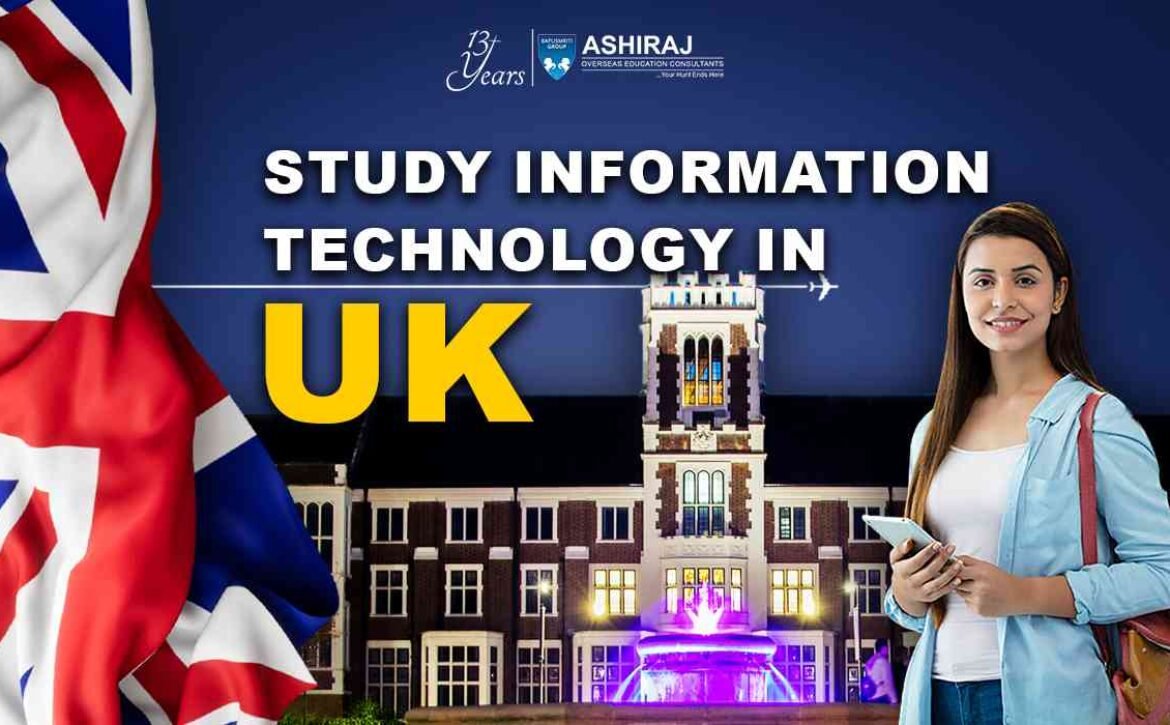
Information Technology in UK
Information technology in the UK has emerged as a cornerstone of modern society, influencing every aspect of business, education, healthcare, and government. With a robust infrastructure and a thriving tech ecosystem, the UK stands at the forefront of technological innovation on the global stage. From startups to multinational corporations, the country fosters a culture of creativity and entrepreneurship, driving advancements in fields like artificial intelligence, cybersecurity, and data analytics.
Information technology in the UK encompasses a diverse array of industries, from software development and telecommunications to e-commerce and fintech. , the UK’s IT sector plays a pivotal role in driving economic growth and fostering digital transformation across various sectors. Moreover, the government’s commitment to investing in digital infrastructure and promoting digital skills ensures that the UK remains a leading destination for tech talent and innovation.
Why to Study Information Technology in UK?
- Thriving Tech Ecosystem: The UK boasts a vibrant tech scene with numerous opportunities for students to engage with cutting-edge technologies and innovative startups.
- World-Class Universities: Renowned universities in the UK offer top-notch programs in information technology, providing students with access to world-class faculty and resources.
- Industry Connections: Studying IT in the UK offers unparalleled networking opportunities, allowing students to connect with industry leaders and potential employers through internships, guest lectures, and career fairs.
- Global Reputation: A degree in IT from a UK university carries significant weight globally, enhancing career prospects and opening doors to job opportunities around the world.
- Diverse Specializations: The UK offers a wide range of IT specializations, from cybersecurity and data science to software engineering and artificial intelligence, allowing students to tailor their studies to their interests and career goals.
- Cutting-Edge Research: UK universities are at the forefront of IT research, providing students with opportunities to contribute to groundbreaking projects and stay updated on the latest developments in the field.
- Cultural Experience: Studying IT in the UK offers an enriching cultural experience, allowing students to immerse themselves in British culture while gaining valuable international perspectives.
pursuing Information technology in the UK offers numerous advantages, making it an ideal destination for aspiring IT professionals.
Top Universities to Study Information Technology in UK
University | QS World University Ranking 2023 | Type of University | Average Annual Fees | Programs Offered |
University of Oxford | 1 | Public | £9,250-£34,678 | Computer Science, Information Systems, AI |
University of Cambridge | 2 | Public | £9,250-£34,678 | Computer Science, Software Engineering, IT Management |
Imperial College London | 4 | Public | £9,250-£34,678 | Computing, Data Science, Cybersecurity |
University College London | 8 | Public | £9,250-£34,678 | Information Technology, Digital Innovation, Web Development |
London School of Economics and Political Science | 25 | Public | £9,250-£34,678 | Information Systems, Business Technology, Digital Transformation |
, this table showcases the top universities in the UK for Information technology. These institutions are renowned for their academic excellence, offering a diverse range of programs in IT-related fields. Whether it’s computer science, data science, or cybersecurity, students can find specialized courses tailored to their interests and career goals. Additionally, the average annual fees provide an overview of the cost of studying at these prestigious universities, making them accessible options for aspiring IT professionals looking to further their education in the UK.
Course Curriculum for Information Technology in UK
- Foundational Courses: The curriculum typically includes foundational courses covering topics such as programming fundamentals, computer architecture, and software engineering principles.
- Specialized Tracks: Students have the opportunity to choose specialized tracks based on their interests and career goals. These tracks may include areas like cybersecurity, data science, artificial intelligence, and web development.
- Practical Learning: Emphasis is placed on hands-on learning through projects, labs, and real-world case studies, allowing students to apply theoretical knowledge to practical situations.
- Industry-Relevant Skills: The curriculum is designed to equip students with the skills and knowledge required to meet the demands of the rapidly evolving IT industry. This includes training in cutting-edge technologies, problem-solving abilities, and communication skills.
- Internships and Work Placements: Many programs offer opportunities for internships and work placements, enabling students to gain valuable industry experience and build professional networks.
the course curriculum of Information technology in the UK is tailored to prepare students for successful careers in the field, providing them with a solid foundation in key concepts and practical skills essential for the ever-growing technology sector.
Eligibility Criteria & Admission Requirements for MS in Information Technology in UK
- Language Proficiency: Applicants must demonstrate proficiency in English by providing either IELTS or TOEFL scores. The minimum required scores for IELTS are 6.5 overall with no less than 6.0 in each section, while for TOEFL, a score of 90 or above is typically required.
- Standardized Tests: Some universities may require applicants to submit GRE or GMAT scores. The minimum required scores vary depending on the institution and program. For GRE, a score of around 320 is commonly accepted, while for GMAT, a score of 650 or higher is often required.
- Academic Qualifications: Applicants must hold a bachelor’s degree in a relevant field with a minimum GPA requirement, typically ranging from 2.5 to 3.0 on a 4.0 scale.
- Passport & Student Visa: International students must possess a valid passport and obtain a student visa to study in the UK. Visa application requirements may include financial proof, acceptance letter from a university, and evidence of English proficiency.
- Academic Certificates: Applicants must provide transcripts and certificates from previous educational institutions as part of the application process.
- Work Experience: While not always mandatory, some programs may require applicants to have relevant work experience in the field of information technology.
Test | Minimum Score |
IELTS | 6.5 overall with no less than 6.0 in each section |
TOEFL | 90 or above |
GRE | Around 320 |
GMAT | 650 or higher |
meeting these eligibility criteria is crucial for prospective students aiming to pursue Information technology in the UK.
Documents Required for Studying Information Technology in UK
- Passport: A valid passport is essential for international students applying to study Information technology in the UK.
- Letters of Recommendation (LOR): Typically, two letters of recommendation from teachers or employers are required to assess the applicant’s academic and professional abilities.
- Statement of Purpose (SOP): An SOP outlining the applicant’s academic background, career goals, and reasons for choosing the specific program is necessary for the application process.
- Curriculum Vitae (CV): A comprehensive CV highlighting the applicant’s academic achievements, work experience, extracurricular activities, and skills is required.
- Official High School Transcripts: Transcripts from high school detailing academic performance are necessary for undergraduate applicants.
- Educational Certificates: Certificates of previous academic qualifications, such as diplomas or degrees, are required for both undergraduate and postgraduate applicants.
- Work Experience Certificate: If applicable, a certificate verifying any relevant work experience in the field of Information technology is needed.
- Proof of Financial Resources: Applicants must provide evidence of sufficient financial resources to cover tuition fees and living expenses for the duration of their studies in the UK.
ensuring the submission of these documents is crucial for prospective students applying to study Information technology in the UK.
Admission Process for Information Technology in UK
- Research: Begin by researching universities offering Information technology programs in the UK. Consider factors such as program curriculum, faculty expertise, and location.
- Check Eligibility: Review the eligibility criteria for the chosen programs, including academic requirements, language proficiency tests (IELTS or TOEFL), and standardized test scores (GRE or GMAT).
- Prepare Documents: Gather necessary documents, including passport, educational transcripts, certificates, letters of recommendation (LOR), statement of purpose (SOP), curriculum vitae (CV), and proof of financial resources.
- Take Language and Standardized Tests: Schedule and take required language proficiency tests (IELTS or TOEFL) and standardized tests (GRE or GMAT) as per the university’s requirements.
- Submit Application: Complete the online application form for the chosen universities, ensuring all required documents are uploaded correctly.
- Pay Application Fee: Pay the application fee as specified by each university. Some universities may waive the fee for certain applicants or offer scholarships.
- Wait for Decision: After applying, wait for the university to review your application. This process may take several weeks to months.
- Receive Offer: If accepted, you will receive an offer of admission from the university. Review the offer carefully and follow any additional instructions provided.
- Accept Offer and Apply for Visa: Once satisfied with the offer, accept it and proceed to apply for a student visa (Tier 4) to study Information technology in the UK.
understanding and following these steps is essential for a successful admission process for Information technology in the UK.
“Education is the most powerful weapon which you can use to change the world.”
Nelson Mandela
Cost of Information Technology Course in UK
- Tuition Fees: The tuition fees for Information technology programs in the UK vary depending on the university, program duration, and level of study (undergraduate or postgraduate). On average, undergraduate tuition fees range from £10,000 to £25,000 per year, while postgraduate fees can range from £12,000 to £30,000 per year.
- Living Expenses: In addition to tuition fees, students must budget for living expenses, including accommodation, food, transportation, and personal expenses. On average, living expenses in the UK can range from £10,000 to £15,000 per year, depending on the location and lifestyle.
- Scholarships and Financial Aid: Many universities in the UK offer scholarships, grants, and financial aid to help offset the cost of studying Information technology. Eligibility criteria for scholarships vary, and students are encouraged to research and apply for available funding opportunities.
- Part-Time Work: Some students may choose to work part-time to supplement their income while studying. However, it’s essential to balance work commitments with academic responsibilities.
- Health Insurance: International students may be required to purchase health insurance as part of their visa requirements, adding to the overall cost of studying in the UK.
understanding the cost implications is crucial for prospective students considering studying Information technology in the UK.
Scholarships for Information Technology Courses in UK
Scholarship Name | Amount | Application Deadline | Eligibility Criteria |
Chancellor’s International Scholarship | Up to £20,000 per year | 31st January | Offered by various UK universities to international students based on academic excellence and potential contribution to the field of Information technology. |
Commonwealth Scholarships | Full tuition fees, living allowance, airfare | Varies | Open to students from Commonwealth countries pursuing postgraduate studies in the UK in fields including Information technology. Applicants must demonstrate academic merit and potential to contribute to the development of their home country. |
Chevening Scholarships | Full tuition fees, living allowance, travel costs | 6th November | Funded by the UK government, open to students from eligible countries worldwide pursuing postgraduate studies in various fields, including Information technology. Applicants must demonstrate leadership qualities and academic excellence. |
Gates Cambridge Scholarships | Full tuition fees, living allowance, airfare, additional funding | 3rd December | For outstanding applicants from any country outside the UK pursuing postgraduate studies at the University of Cambridge, including Information technology. Applicants must demonstrate intellectual ability, leadership potential, and a commitment to improving the lives of others. |
, these scholarships offer valuable opportunities for students pursuing Information technology in the UK, providing financial support and recognition for academic excellence.
Career Opportunities After Information Technology in UK
Job Profile | Average Salary (GBP) |
Software Developer | £30,000 – £50,000 |
Data Analyst | £25,000 – £40,000 |
Cybersecurity Analyst | £35,000 – £60,000 |
IT Project Manager | £40,000 – £70,000 |
Systems Engineer | £35,000 – £55,000 |
In the dynamic landscape of Information technology in the UK, various career opportunities await skilled professionals.
- Software Developer: Responsible for designing, developing, and testing software applications, with salaries ranging from £30,000 to £50,000 per year.
- Data Analyst: Analyzes data to extract insights and inform business decisions, with average salaries ranging from £25,000 to £40,000 annually.
- Cybersecurity Analyst: Protects computer systems and networks from cyber threats, with salaries averaging between £35,000 and £60,000 per year.
- IT Project Manager: Oversees IT projects from initiation to completion, ensuring they are delivered on time and within budget, with salaries ranging from £40,000 to £70,000 annually.
- Systems Engineer: Designs and manages complex IT systems, with average salaries ranging from £35,000 to £55,000 per year.
These career opportunities underscore the significance of Information technology in the UK, offering lucrative salaries and opportunities for professional growth and development.
Frequently Asked Questions About Information Technology in UK
Some of the top universities offering Information technology programs in the UK include the University of Oxford, University of Cambridge, Imperial College London, University College London, and London School of Economics and Political Science.
The average tuition fees for Information technology programs in the UK vary depending on the university and level of study. However, undergraduate tuition fees typically range from £10,000 to £25,000 per year, while postgraduate fees can range from £12,000 to £30,000 per year.
Yes, there are scholarships available for international students pursuing Information technology studies in the UK. These scholarships may be offered by universities, governments, or private organizations and can help cover tuition fees, living expenses, and other costs associated with studying abroad.
Graduates of Information technology programs in the UK can pursue various career paths, including roles as software developers, data analysts, cybersecurity specialists, IT project managers, and systems engineers. The demand for skilled IT professionals is high, with opportunities available in both the public and private sectors.
While work experience is not always mandatory, having relevant experience in the field can enhance your chances of admission to top universities and improve your employability upon graduation. Many programs may offer internships or work placements as part of the curriculum.
Universities in the UK typically accept scores from English language proficiency tests such as IELTS (International English Language Testing System) and TOEFL (Test of English as a Foreign Language) as proof of language proficiency for international students.
Application deadlines for Information technology programs in the UK vary depending on the university and the level of study. It’s essential to check the specific deadlines for each program you’re interested in and submit your application before the deadline to ensure consideration.
Yes, international students studying Information technology in the UK are generally allowed to work part-time during term time and full-time during vacations. However, there may be restrictions depending on your visa status, so it’s essential to check the regulations.
The required documents may include academic transcripts, certificates, letters of recommendation, a statement of purpose, a CV, proof of language proficiency, and proof of financial resources. Specific requirements may vary by university.
Yes, the UK is known for its strong research and innovation ecosystem in Information technology. Universities, research institutes, and industry collaborations provide ample opportunities for students and professionals to engage in cutting-edge research and innovation projects.




